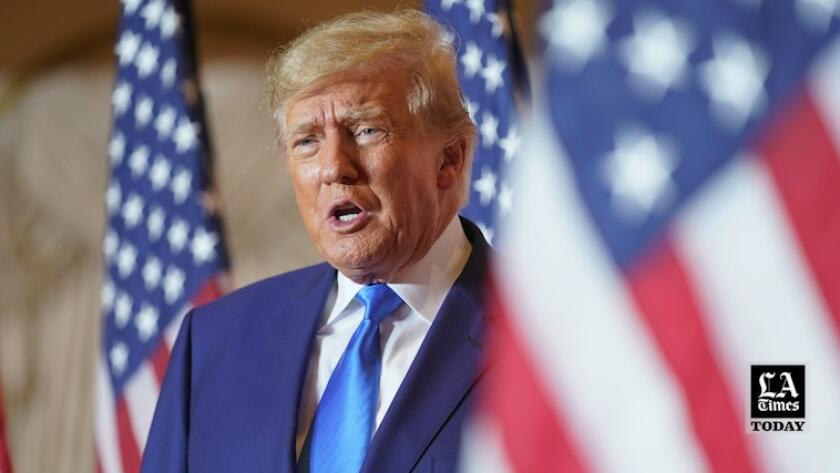News Analysis: Trump is running again, uphill

Former President Trump declared Tuesday he will mount a third run for the White House, telling a crowd at his Mar-a-Lago estate in Florida, “In order to make America great and glorious again, I am tonight announcing my candidacy for president of the United States.”
WASHINGTON — In announcing his candidacy Tuesday night, former President Trump has reverted to a familiar tactic — meeting weakness with hubris.
“In order to make America great and glorious again, I am tonight announcing my candidacy for president,” Trump said. “I am running because I believe the world has not yet seen the truth and glory of what this nation can be.”
Trump, impeached twice and under investigation for trying to overturn the 2020 election, made the unprecedented announcement from his gilded Florida home to an audience of supporters. Over more than an hour, he vacillated between reading a teleprompter and speaking off the cuff — mixing boasts, insults, promises, grievances, threats and conspiracy, including an evidence-free insinuation that China interfered in the 2020 election.
He framed his administration in idyllic terms, ignoring criticism of how he handled the COVID-19 pandemic and the dysfunction that led to his electoral defeat. He painted a bleak picture of the Biden administration, vowing to reverse nearly everything his successor has done.
“We were a strong nation, and importantly, we were a free nation,” Trump said. “But now we are a nation in decline. We are a failing nation. For millions of Americans, the past two years under Joe Biden had been a time of pain, hardship, anxiety and despair.”
Many of the lines were lifted verbatim from patter he developed over the last six years at rallies and in speeches. He promised the death penalty for drug dealers, vowed to dispatch federal law enforcement to bring order to American cities, denounced critical race theory, promoted trade tariffs and portrayed illegal immigration as one of the country’s most pressing problems.
“We have no idea who they are and where they come from,” he said of immigrants. “We have no idea what’s happening to our country. We’re being poisoned.”
Trump has been here before, perceived by opponents as vulnerable and by allies as distracting or worse, only to reemerge with the help of his loyal base. The question this time is whether Republican leaders, furious after three disappointing elections in which the GOP underperformed, will have the stomach and the wherewithal to thwart Trump.
“He’s obviously weaker today than he was a week ago,” said Whit Ayres, a Republican pollster. “The real question is how much weaker, and we don’t know that.”
Trump’s staying power has become an enduring problem for his party as he wields outsize sway in Republican primaries while proving a drag in general elections.
Amid signs Trump is losing his grip on the Republican Party, a familiar appeal to grievance. Will his GOP rivals be as deferential as they were before?
Most losing presidential candidates leave center stage, at least for a time. Former President Carter, another one-term president, retreated from partisan politics. After being defeated in the closely contested 2000 election, Democrat Al Gore threw his energy into environmental activism. Mitt Romney, who lost the 2012 presidential contest, remade himself as a senator. Only one president, Grover Cleveland, served two nonconsecutive terms, more than a century ago.
Trump, after inspiring an angry mob to storm the Capitol following his 2020 loss to Democrat Joe Biden, continued to press the lie that he won the election. He made fealty to that lie a litmus test for candidates in Republican primaries. Yet, many of the high-profile candidates he endorsed in key swing states were rejected by voters last week. It was a stunning string of setbacks for a party that was hoping to take advantage of a favorable electoral environment.
“With inflation [at] a 40-year high, crime out of control in the major cities, the border still porous and Biden approval at historic lows, Republicans should have run away with these elections,” Ayres said.
In his speech, Trump conceded that the party should have done better. But he refused to take blame, insisting his successes, including the expectation that Republicans will take control of the House, were being underappreciated.
“They say, ‘Let’s win by 40 seats,’” Trump said. “If you win by two seats, be happy.”
By refusing to accept his 2020 defeat and then pressuring his vice president to overturn the result, Trump also delayed the traditional process in which losing parties take stock of their policy positions and tactics in hopes of regaining voters’ trust. The Republican Party, which failed to win control of the Senate and is likely to win the House by only a narrow margin, is instead engulfed in internal turmoil over who is to blame and who should lead the party in each chamber.
Republicans see a golden opportunity to unseat President Biden, who turns 80 on Sunday and has been dogged by low approval ratings most of this year. Biden has said he is all but certain to run for reelection, stating last week that he would probably make a final decision in January after meeting with family.
Trump’s advisors urged him publicly to wait to announce his candidacy until a Senate runoff election next month in Georgia between Sen. Raphael Warnock, a Democrat, and Republican Herschel Walker, a Trump acolyte.
Exit polls from last week showed why: 58% of voters said Trump was a factor in their votes, an unheard-of influence for a former president. Among Georgia voters who said Trump was a factor in their vote, Warnock won 57% to 41%. Walker won 55% to 42% among people who said Trump was not a factor.
Many voters appeared to agree with Biden and other Democrats that Trump’s ideology represented a threat to democracy. In the national exit poll, 86% of voters said the future of democracy was an important factor in their decision, with a majority of those voters choosing Democratic candidates. Ardent backers of Trump’s election lie, including Arizona gubernatorial candidate Kari Lake, lost.
The Club for Growth, an influential conservative organization that has at times backed Trump, on Monday weighed in against the former president’s reboot, releasing a poll showing Florida Gov. Ron DeSantis defeating Trump in several early primary states.
Watch L.A. Times Today at 7 p.m. on Spectrum News 1 on Channel 1 or live stream on the Spectrum News App. Palos Verdes Peninsula and Orange County viewers can watch on Cox Systems on channel 99.
“Republican primary voters recognize Trump’s insults against Republicans as hollow and counterproductive, and it’s taking a significant toll on his support,” the group’s president, former Republican Rep. David McIntosh of Indiana, said in a statement.
Fox News, his most important media ally, cut away from his speech for a long stretch, even as guests praised it.
Internal politics are not Trump’s only hurdle. He also faces multiple civil and criminal investigations, including federal probes into his role in the Jan. 6 insurrection and his refusal to turn over classified presidential records after leaving the White House. Critics have suggested that Trump’s early announcement is calculated to help him avoid potential charges.
Trump is betting that he can defeat potential criminal charges in the political arena the way he’s beaten back other investigations, by portraying himself as the victim of the establishment.
“I’m a victim, I will tell you, I’m a victim,” Trump said, decrying “the weaponization of the justice system, the FBI” and the Department of Justice while pledging “to clean out the festering rot and corruption of Washington.”
But former prosecutors say Justice Department officials are not likely to be influenced by Trump becoming an official candidate.
Andrew Weissmann, who was a lead prosecutor in special counsel Robert S. Mueller III’s office, said that there is no precedent for Trump’s situation, and that his presidential campaign may put pressure on Atty. Gen. Merrick Garland to appoint a special counsel. Even so, Weissmann said, it will be Garland who will ultimately have to decide whether Trump should face criminal charges.
“You don’t insulate yourself from being charged or the timing of it,” said Weissmann, a law professor at New York University.
Trump’s announcement is also not likely to affect a lawsuit by New York’s attorney general that alleged Trump and his company engaged in widespread financial fraud.
His ability to win the GOP nomination will hinge largely on whether he keeps his base. A YouGov poll taken after last week’s elections showed DeSantis narrowly defeating Trump 41% to 39% among Republican voters in a hypothetical primary. But that outcome will depend on many factors, including DeSantis’ decision to run and the size of a potential field. Trump defeated 16 opponents in 2016, taking advantage of the splintered nature of the party and the inability of his opponents to unite.
The last time, Trump also had the advantage of surprise — and the excitement of novelty.
“I’m the first to admit that South Carolina insiders really missed it,” said Matt Moore, who led the South Carolina Republican Party, which holds one of the earliest primaries, during the 2016 election. “Something amazing was happening, based on crowd sizes and support for Trump. But it’s hard to capture lightning in a bottle twice. That was a wild time.”
Times staff writer Arit John contributed to this report.
More to Read
Get the L.A. Times Politics newsletter
Deeply reported insights into legislation, politics and policy from Sacramento, Washington and beyond. In your inbox three times per week.
You may occasionally receive promotional content from the Los Angeles Times.













